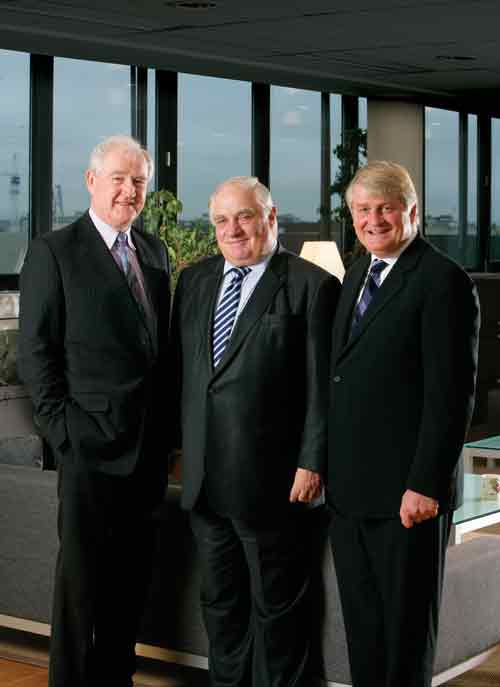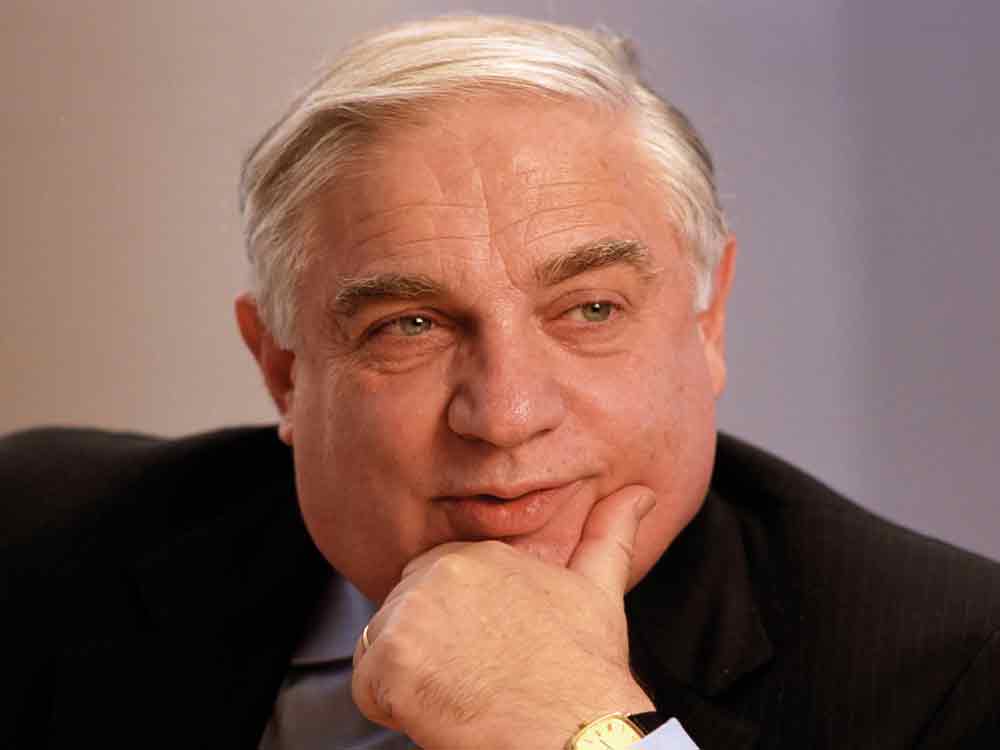To mark the passing of one of Ireland’s most outstanding leaders in the international political and corporate world, we publish our final interview with Peter Sutherland, in conversation with Ian Hyland.
Attorney general, European commissioner, director general of the General Agreement on Tariffs and Trade (GATT), director general of the World Trade Organisation (WTO), chairmanships of BP and Goldman Sachs… Peter Sutherland has undoubtedly enjoyed an illustrious career. In fact, he was described by one newspaper as possibly having the best CV on the planet.
Prior to embarking on an international career that straddled politics and business, the Gonzaga- and UCD-educated barrister served on the board of a number of Irish businesses, becoming chairman of Allied Irish Bank and the first chairman of Shannon Aerospace, as well as joining the boards of CRH and Guinness Peat Aviation (GPA).
Needless to say, the Irish business landscape has changed substantially since the beginning of his career. “My recollections of those times are that they were a time of both extreme economic difficulty and transition of attitude from closed to open, in terms of our future,” recalls Sutherland.


Sutherland served as attorney general under Garret FitzGerald’s two governments during a period of straightened economic times in the early- and mid-1980s. However, it appeared to him that a significant economic transition was underway. The import substitute economy and the protectionist attitude that Ireland had adopted following independence was rapidly losing favour.
Instead, the Irish economy was becoming increasingly plugged into the international trading system. Sutherland’s role within the European Commission (1985-1989) was of huge relevance too. He was part of a triumvirate of commissioners who were responsible for the 1992 reforms, which included free movement of goods, persons, capital and services. “I had learned through my experience in government that this was nationally extremely important,” Sutherland says. On the request of Jack Delors, president of the European Commission, Sutherland was asked to devise a method through which the 1992 Programme could be implemented. The result was the Sutherland Report.
“This has been transformative in the Irish economy ever since,” he adds. At this time, it became evident that there had to be a focus on attracting inward investment, since Ireland lacked the industrial skillset to establish its own industries. He points to some pioneers – Smurfit, CRH and GPA – that were innovative. Combining these companies and a rapidly developing banking industry provided the basis for solid growth. But he was under no illusions – another leg to Ireland’s growth strategy was needed.
“We didn’t have enough of indigenous industry to present a future for our young people,” Sutherland says. Creating employment and the generation of growth depended on attracting large volumes of foreign direct investment.
Good Europeans
Given Ireland’s dependence on the United Kingdom, Europe was of exceptional importance in this context. “Europe was at that time the crucial element in providing us with a future,” Sutherland says. The old Anglo-Irish Trade Agreement generated opportunity but ultimately an over-dependence on the United Kingdom. Therefore Europe was perceived as the vehicle for industrial strategy as well as political advancement and engagement, he says.
Proclaiming that we are “good Europeans” is a position with which Sutherland does not agree. While he questions the necessity for some of the nine referenda that were held on various EU treaties over the past four decades, he points to the fact that Ireland has on a number of occasions stopped Europe in its tracks. “I believe we were unduly sensitive and have been on the issue of neutrality over a prolonged period of time,” he says.
Britain voted to leave the EU in 2016, posing huge challenges for Ireland. Sutherland says that a new trade deal between the EU and the UK must not disadvantage Irish products. The free movement of goods and people between Britain and Ireland must be maintained, he says.
“Paradoxically it could have the effect of stimulating further foreign direct investment into the Republic of Ireland,” he adds. Britain will be a huge loss to the EU because it has always been one of the members most committed to open borders and free trade. Even though Brexit will be bad for both Britain and the EU, “it will not be a fatal blow to the Irish economy”.
Pictured: Peter Sutherland on the cover of Business & Finance, September/October 2005.
Prospects of the Irish economy
While he believes that the Irish economy is in a good position, following a catastrophic down, he errs on the side of caution. “I think that we must be careful not to get carried away, because there are dangers still out there,” Sutherland says.
The eurozone still faces huge challenges, particularly high debt levels among periphery member states. Sutherland feels this may lead to further traumas in the future. He also points to Ireland’s heavy debt burden. “This is going to mean a continued need to be very cautious and prudent,” he says.
Yet in terms of the outlook for foreign direct investment, the future for Ireland is bright because of a number of advantages: an English-speaking country, being in the EU unlike the United Kingdom after Brexit, access to a vast market, and a demographic profile that is positive in terms of youth and education.
“I think Ireland should have a positive view of its own future,” Sutherland says. In relation to underpinning Ireland’s position as an open trading economy, he has a simple message: “Competitiveness will determine investment.”
It is important that this level of competitiveness is maintained, Sutherland says: “We’re in an open market, and we absolutely need an open market in Europe to provide employment, so it is in our own hands to remain competitive.”
With regard to emigration it is a personal choice based on opportunity that young people must have. “For some it may be an appropriate thing at an appropriate time. For others it may not be, but it is a personal choice,” he says. The common refrain that those who emigrate will gain experience and come home is not self-evident, he says – many will not come back. With this in mind, he believes that the government should instead harness the efforts of the global Irish. “The experiences of the people outside the country may be valuable to those inside it,” he adds.
Pictured L-R; Feargal Quinn, Charles Haughey and Peter Sutherland, during his tenure as EEC Commissioner in the 1980s.
There are opportunities for investment into Ireland that can be stimulated abroad. Sutherland draws on one example: the connection between Silicon Valley and technology companies in Ireland, a relationship that he believes has been immensely valuable. “Every company I’ve ever served on, we’ve had significant Irish input,” Sutherland says.
Within the banking sector, according to Sutherland, the fundamental issue is the skillset of risk analysis. It is his opinion that capital will be available to lend if there is sufficient confidence in the capacity to evaluate risk. However, if the skillset necessary to effectively evaluate the entity to which you are lending is absent, he believes, there will be a reluctance to lend such capital.
Looking at Ireland’s future, he cites pioneers of Irish business who have enjoyed phenomenal success such as Tony Ryan in the aircraft leasing business. It is these accomplishments, he believes, that we must nurture.
For a small open economy, it is essential that all the arms of the State are working together for the benefit of the economy. It also means that there should be clear and open lines of communication between the civil service, the government and business. “I think one of the dangers of the current toxic environment is that communication may be limited because of fears of contamination,” he says.
Pictured at the 2002 opening of The Sutherland Centre at Trinity College Dublin, which houses the Institute for International Integration Studies: Dr. John Hegarty, then-Provost Trinity College, Mary Harney, then-Tanaiste, and Peter Sutherland (Chairman of BP and Goldman Sachs International at the time).
Anglo-Irish Relations
As a man who describes himself as “intensely Irish”, Sutherland has never experienced any negativity towards the Irish people while based in Britain. He thinks there is an immensely positive attitude from Britain to Ireland, and British people to Irish people. He recalls an occasion where as attorney general he travelled to Britain to visit his opposite number Michael Havers, the UK attorney general in the early 1980s. Having spent three hours talking to Havers and conversing over lunch, the UK attorney general casually said: “Did you not hear they blew up my house in Wimbledon last night?” Yet while the memory of mortar bombing Downing Street is recent history, he has never found the slightest degree of antagonism towards the Irish.
He also says that many Irish people have accomplished much in Britain, and have been accepted at the top of British industry. “I have no doubt that a properly managed independence is the best way for us in terms of our relationship,” he says. Britain, according to Sutherland, is good for Ireland.
Interestingly, the two most distinguishing moments in Sutherland’s career are in the fields of politics and economics, rather than business as such: his role with the World Trade Organisation and his appointment to the European Commission. The creation of the World Trade Organisation was undeniably a pivotal moment for him. “It defined everything for me,” Sutherland says of becoming its first director general.
The pinnacle of his time with the European Commission was the Competition Directorate, which opened up competition in air transport and telecommunications across Europe. As commissioner for education, he is most proud of the establishment of the Erasmus (European Regional Action Scheme for Mobility of University Students) programme.
Peter Sutherland accepts an award for Lifetime Achievment and Contribution to the Irish Economy, from Ian Hyland, Publisher of Business & Finance, in Decemeber 2007.
“My emotional connection has most been to Europe and that has remained as fervent when I was a commissioner as it is now,” Sutherland adds. While acknowledging the pride he felt while serving as the chairman of BP for a 13-year period, the credit for the business’s successes, in his mind, rests with the executive rather than the chairman.
For Peter Sutherland, there is no one person within the realm of Irish business to be highlighted. Instead, he asserts that it is the collective efforts of many influential Irish businesspeople who have had a significant impact on shaping Ireland as it is today. “It is invidious to pick one, because there were a number of great Irish businessmen,” he says – an observation itself formed throughout a unique career as an Irish businessman on the international stage.
This interview appears in Ireland Inc: A History of Irish Business.
From the Archives
Peter Sutherland was awarded Business & Finance Business Person of the Month in July 2008, recognising his activities as Chairman of BP during a crisis in their Russian operations. Read more here.

